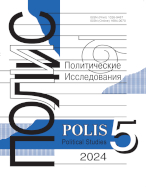Political Community:
Construction and Institutionalization
Panov P.V.,
Dr. Sci. (Polit. Sci.), Leading Researcher, Perm Federal Research Center, Ural Branch of Russian Academy of Sciences, panov.petr@gmail.com
elibrary_id: 77223 | ORCID: 0000-0002-0759-7618 | RESEARCHER_ID: O-2160-2016
DOI: 10.17976/jpps/2007.01.07
Panov P.V. Political Community: Construction and Institutionalization . – Polis. Political Studies. 2007. No. 1. https://doi.org/10.17976/jpps/2007.01.07
The article contains analysis of the heuristic potential of the concept “political community” as applied to the research of “static characteristics” of the Russian polity. On considering the most important aspects of the notion of political community, as well as a number of problems related to the institutionalization of such community (in particular, effects of the “import of institutions”), the author comes to the conclusion that the cognitive value of the said concept consists first of all in that it is not “external” (“essentialist”), but “internal” (“constructionist”) characteristics of a social entity, the subjective dynamism of the institutionalization of political order, that it fixes in itself, allowing, thus, to analyze and explain the extent of stability of this or that polity, the possibilities and the limits of its transformation.
See also:
Peregudov S.P.,
Transnational Corporations on the Way to Corporate Citizenship. – Polis. Political Studies. 2004. No3
Fyodorov K.G.,
The Policy in the Sphere of Local Taxation in Russia. – Polis. Political Studies. 2003. No4
Sergeev V.M.,
How Are Social Changes Possible? (Prolegomena to a Statistical Theory of Social Networks). – Polis. Political Studies. 2001. No6
Kolosov V.A., Borodulina N.A.,
Electoral Preferences in Cities and Large Towns of Russia: Types and Stability. – Polis. Political Studies. 2004. No4
Dolgov V.M.,
Political Mechanisms of Interaction of the Center and Regions of the Russian Federation. – Polis. Political Studies. 2004. No6





.jpg)






 print
print
.jpg)
.jpg)